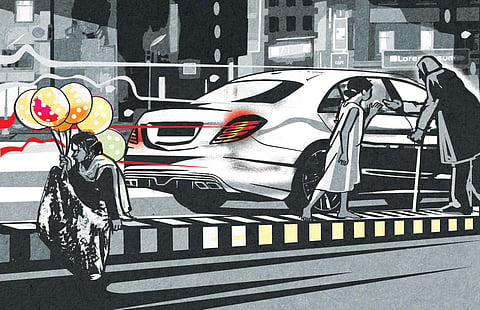

The 2023 Oxfam report on Indian inequality would have come as no surprise to anyone with a casual power of observation. Look around at a traffic junction, and you will most likely see a sea of luxury cars swarmed by beggars. Hundreds eke out a living peddling cheap toys and peanuts, trying desperately to grab the attention of those in the air-conditioned cocoon of the cars, busy with their iPads. A village of destitutes springs up under the flyovers overnight, only to pack their rags and run for the next refuge when the police chase them away. Our malls sell popcorn for Rs 500 a packet, an average cinema ticket in a multiplex in the metro costs around Rs 300, and dining out with family can easily set back one by a few thousand rupees.
We can’t do even such mundane middle-class indulgences without feeling guilty as the average daily wages in the country cannot even fetch a half packet of that insipid popcorn. India has become a country with tiny islands of prosperity in a vast sea of destitution. So is it any wonder when such reports reiterate what is known to everyone? India has always been an unequal society by design, with the caste system acting as its framework. Most of the country is yet to come out of the medieval mindset regarding its attitude against women. In such a society, the increasing financial gap is exceptionally worrying.
We are growing at a tremendous pace. Wealth is being generated at astronomical levels, and there is a spectacular boom in infrastructure projects. On the other hand, wages have remained stagnant and unemployment is rampant. The agricultural sector is still stuck in the pre-1991 socialist era and badly needs reforms. The hurriedly conceived farm bill, the blind opposition of the same for political reasons and the quick withdrawal—instead of a proper parliamentary debate and course correction—have ensured that the farmers of our country are trapped in the same dilemma that had kept them entrapped in poverty. The numbers thrown up by the Oxfam report can give sleepless nights to concerned citizens and the responsible ruler. Top 1 per cent of the Indian population holds 40.5 per cent of the national wealth. The country still has the world’s highest number of poor at 228.9 million. According to the report, the total number of billionaires in India increased from 102 in 2020 to 166 in 2022. The combined wealth of India’s 100 richest has touched Rs 54.12 lakh crore.
According to the estimates of the World Health Organization (WHO) report from March 2022, high expenditure on health is impoverishing some 55 million Indians annually. The Indian government spends the least on public healthcare in the world. At the same time, we are focused on creating world-class facilities to attract medical tourists from affluent countries. The conventional socialist approach to such inequality would tax the rich and the middle-class more and give freebies to the poor. We have seen that such policies have not taken us anywhere during the heydays of Indian ‘Licence Raj’ and socialism. What the poor requires is equal opportunity and not freebies and election goodies. The minimum wages in every sector need to be reworked to a higher level. This will hurt the middle-class pockets more, but it will stop us from exploiting the destitute. India offers Asia’s most competitive labour costs, with the national minimum wage at around Rs 178. This is ridiculous, and Indians can’t keep competing on low wages alone. There has to be a place for innovation in industry instead of depending on running sweatshops.
A house-help should get a living wage of at least Rs 18,000 to Rs 22,000 for eight hours in a city like Mumbai or Chennai by law. As we have a vast population of the destitute, the rich and the middle-class are getting away by paying a pittance to the desperate job-seekers. Since the laws are slack and they have no choice, the poor who flock to the cities will take work for a pittance and turn into squatters occupying public land. The slums in the cities such as Mumbai or Chennai represent this vicious cycle of exploitation and lawlessness. It is not the tax that needs to increase but the wages. We cannot bring equality by taxing the rich with rates as high as 90 per cent of the Indira Gandhi-era, killing entrepreneurs or bringing back Licence Raj. We also cannot continue to fatten the rich by allowing blatant exploitation of the desperate. Raising wages through law, instead of waiting for the market to regulate itself, will help us bring down inequality and create a virtuous cycle.
Anand Neelakantan
Author of Asura, Ajaya series, Vanara and Bahubali trilogy
mail@asura.co.in